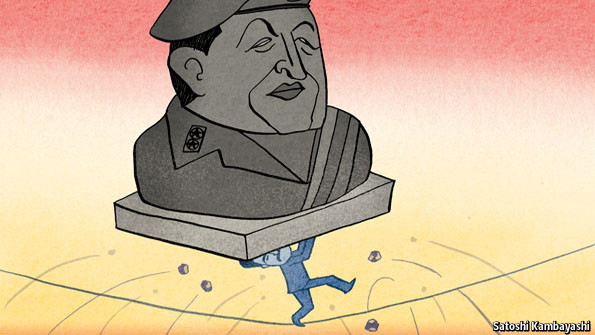VENEZUELA'S ECONOMY: MADURO'S BALANCING ACT

The Economist
IT IS a remarkable achievement. Amid the longest oil boom in history Venezuela has in many respects the worst-performing economy in the Americas, even though it has (it claims) the world’s biggest reserves of the black stuff and gets 94% of its export earnings from it. That is the legacy of 14 years of “21st-century socialism” under the late Hugo Chávez. Inflation is over 45% a year and supermarket shelves are bare of many staple goods. Even Nelson Merentes, the finance minister, concedes that Mr Chávez’s revolution has yet to achieve economic success. But oil revenues of $90 billion a year allow Nicolás Maduro, Mr Chávez’s successor as president, the luxury of debating whether or not to change course.
After contracting for several months, the economy grew in the second quarter. August’s inflation of 3% was half the monthly rate in May. But most economists do not believe a sustainable recovery has begun. The growth spurt appears to come from a fiscal splurge; the budget deficit is probably around 10% of GDP. A decade and a half of hyper-regulation, including ever more stringent price and exchange controls, has inflicted “terrible distortions” which will be hard to correct, even given the political will, says José Manuel Puente of IESA, a business school in Caracas.
Foreign exchange has been largely allocated by government fiat since 2003. On the black market, the dollar commands more than six times the official exchange rate of 6.3 bolivares. The government handed out more hard currency in the second quarter, which may have boosted growth. Mr Merentes is more pragmatic than his predecessor Jorge Giordani, a Utopian Marxist. Following a 32% devaluation in January there is talk of another, or even of floating the bolívar, though Mr Giordani, who is now planning minister, opposes this. Opportunists who delight in the profits to be made from graft and arbitrage, are happy to go along with him.The government’s main response to the scarcity of food and other staples, such as toilet paper and toothpaste, is a conspiracy theory. It blames an “economic war” waged by the United States and its “fascist” allies in the Venezuelan opposition. On September 20th it sent the national guard to occupy a big toilet-paper factory. Officials said the “temporary” takeover was needed to check for irregularities in production and distribution.
Mr Maduro claimed recently that in meetings at the White House earlier this year a plan was hatched to engineer the “total collapse” of the Venezuelan economy in October. A huge power cut affecting 18 (out of 24) states on September 3rd was due to sabotage, he said, as was a refinery explosion last year that killed 49 people. This month he set up an army-backed task-force to tackle the supposed plot, with the help of 0800-SABOTAJE, a hot-line. Mr Maduro has produced not a scrap of evidence for these claims. The private sector wearily promised to collaborate. After all, said one business leader, “we already face 50 to 100 inspections a month of various kinds, so what is one more?”
While regime leaders squabble over how best to conserve the legacy of Mr Chávez—now known, North Korean-style, as “the eternal leader”—economists debate how long Venezuela’s foreign-currency reserves can stand the current rate of attrition. They have plummeted by around a quarter this year, thanks in part to the fall in the price of gold, of which they largely consist. Liquid reserves amount to less than a month’s imports. There could be another $20 billion or so in opaque off-budget funds, but up to a third of this may be earmarked for specific projects. This week Mr Maduro was in Beijing, where he confirmed a fresh $5 billion credit line (with strings attached) and $15 billion in long-term oil and mining investments.
The pragmatists argue that an adjustment is unavoidable. But Mr Maduro faces local elections on December 8th which are widely viewed as a plebiscite on his rule. IVAD, a pollster, recently found that two-thirds of those it surveyed saw the economy as being in bad shape—and they blamed the government. Less than 4% believed the official line about “sabotage”.
Mr Maduro is caught in a trap of his predecessor’s making. If he sticks to the recipes of the radicals, the economy will only worsen. If he abandons them, he risks being labelled a reformist traitor and exacerbating faction-fighting within the regime. For the moment, he is moving cautiously in the direction of reform, even as he bangs the revolutionary drum and cracks down on dissent. For the president, who recently managed to fall off a bicycle on live television, it is a tricky balancing act.

No hay comentarios:
Publicar un comentario